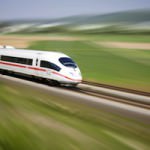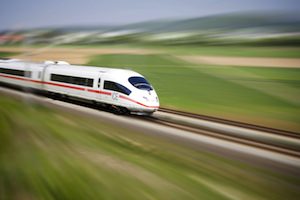 High Speed Rail 2 is a case study on how the Westminster parties that lead the No campaign don’t act in Scotland’s best interests.
High Speed Rail 2 is a case study on how the Westminster parties that lead the No campaign don’t act in Scotland’s best interests.
High Speed Rail 2 (HS2) is a white elephant that Business for Scotland opposed from day one.
We have consistently criticised this unsustainable, unaffordable and economically nonsensical project and in doing so predicted it would damage the economy of Scotland, in particular Aberdeen and Dundee.
The Westminster Government says one thing in public and another in private.
Information released this week under a Freedom of Information request by BBC2’s Newsnight programme shows the Westminster Government have been misleading Scotland and several English regions on the project’s economic impact. London’s Department for Transport previously pointed to selective extracts of a study by global accountancy firm KPMG – which stated the UK economy would gain by £15 billion a year – and the greatest benefit would fall to Greater London (£2.8bn) and the West Midlands (£1.5bn).
However, the full report has now been released against Westminster’s wishes and it makes clear that other regions will lose out substantially. The report that the No Campaign wanted to keep secret clearly states that Aberdeen’s economy will lose out as a direct result of HS2 to the tune of £220m a year and Dundee by a further £96m – not as one off costs but every year ongoing. This means that Scots will lose their jobs as a direct result of the contraction in the North East economy resulting from this project.
This is entirely unacceptable and offers documented proof that the economic plans made in Westminster are tailored almost entirely to London and the South East often against Scotland’s competitive interests.
The estimated cost of the project rose from an initial guess by Westminster of £25bn to the latest admission of £40bn. The well respected The Institute of Economic Affairs (IEA) predicts the eventual cost will be upwards of £80bn. As part of the Westminster system, Scotland’s people represent 8.4% of the country’s population but contributed 9.9% of the UK’s taxation revenues in 2011/12. So we are paying at least £7.92bn out of your taxes to a project that will rip at least £316 million GDP from the economy of the East coast per year – How does that make us better together?
HS2 was approved by the No Campaign’s Alistair Darling in his capacity as Chancellor of the Exchequer. Business for Scotland has lead the criticism of HS2 with clear economic rationale and so Alistair Darling realised he was vulnerable to fair criticism on his support of this indefensible project. In a desperate, cynical but failed attempt to distance himself from a project he approved he has recently joined the list of those calling for it to be scrapped. Maybe it would have been better if he added up the numbers properly and protected Scotland’s interests in the first place. He was either complicit in putting London first or asleep at the wheel when the economic analysis was being compiled, or both. As a well respected Scottish businessman made clear in a speech last weekend, Alistair Darling is becoming known as the No Campaign’s Weapon of Maths Destruction!
Reaction to the news
James Bream, Policy Director of Aberdeen’s Chamber of Commerce stated “it was really disappointing that such a huge number was left out of the original economic impact report”.
The Department for Transport issued a statement saying “These figures show that the new North/South railway is vital to rebalance our economy and it boosts the north overall more than the south.” For the record, from where Westminster civil servants sit in Whitehall, the North is Manchester and Leeds. From an office in Aberdeen or Dundee, Manchester is a long way South!
And finally, the chief executive of HS2 Ltd Alison Munro didn’t exactly give a robust defence when she described the newly released figures as “unsurprising”. Well at least Hs2 and Business for Scotland agree on something.
Conclusion
We now have clear independent evidence that HS2 like so many other projects aimed at boosting London and the South East of England is not only puling Scottish tax revenues but also dragging economic activity away from Scotland’s regions. Westminster tried to hide the damage to Scotland’s economy proving they say one thing in public and another in private.
The economic impact of HS2 on the Scottish east coast alone is enough to merit cancelation. Of course, if Scottish interests meant anything to the Westminster parties and indeed Alistair Darling in the No Campaign, the project would never have got the go ahead. If Hs2 is canceled, it will be because areas such as Essex, Cambridge and Bristol will also lose out, and they have political clout in the Westminster system. Our only prospect of stopping these kinds of damaging decisions from London is to take control of our own wealth and invest in Scotland through the powers of independence.
Update: Victory – Since the UK government has now been forced to admit that Hs2 will never reach Scotland. The civil servants who compile the GERS report have confirmed to Business for Scotland that they will now refuse to accept any contributions to the cost of Hs2 on Scotland’s behalf.
 High Speed Rail 2 is a case study on how the Westminster parties that lead the No campaign don’t act in Scotland’s best interests.
High Speed Rail 2 is a case study on how the Westminster parties that lead the No campaign don’t act in Scotland’s best interests.







It will statistically benefit a larger group of people than it will not (including benefiting a large part of Scotland).
High Speed Rail is the way forward. Many of Europe’s major cities have it, and Japan has had it for nearly 40 years. Would it be more palatable if a speed cap was placed on HS2 up the east coast of Scotland? What about the proposed high speed link between Edinburgh and Glasgow, which this article fails to mention?
On another note, HS2 has to be built outwards from London to make it financially viable. Capital cities – like in the majority of the world – in the centre of most industry and population.
Option 1: Perhaps we should spend this money geographically moving this entire region to Lancashire, then build a new railway system that’s equidistant to all parts of the UK.
Option 2: Strike a deal where Scotland gets 2 metres of track for very 1 metre laid in England?
If all projects start in London and reach Scotland 50 years later or never in the car of Euro Central – then that slows our growth and connectivity. sorry but your comment is wrong on several counts capital cities only have the draining effect that London has on the rest of the UK if your economic policies are too centric on the city. Does Washington dominate New York, Canberra V Sydney, The Haig V Amsterdam, would Edinburgh dominate Glasgow – only if we get it wrong.
How would you like Scotland to lose £316,000,000 a year?
If you live in Aberdeen or Dundee this is how much will be gone,
thanks to Alistair Darling’s incompetence,
and to his Westminster cronies’ desire to centralise everything to London!
We get our economy crippled to make the rich in London richer!
Vote YES to scupper this atrocity in Scotland!
I say this more as someone who supports high speed rail than opposes independence, but I think it’s pretty dubious to take an estimate in a report where 19 out of 23 Scottish regions are said to benefit from HS2 and spin it as a story where it’s a bad thing for the Scottish economy. Any large infrastructure project of this nature is bound to help some areas and hurt others – 19 out of 23 isn’t a bad result in that sense.
Moreover, the same estimate we’re quoting here – the “low estimate” – actually states that South Lanarkshire will benefit the most in percentage increase of local GDP of any region in the whole of the UK. Either that’s correct or the estimates are completely flawed in the first place (at which point there’s no story). I don’t see any argument against HS2 either way.
I’m a bit of a floating voter when it comes to independence, but I am a strong supporter of high speed rail and I find it a bit depressing to see the issue being attacked in this way. In general, upgrading to high speed rail provides economic benefits – it might not generate brilliant immediate returns in relation to cost, but few infrastructure projects do. It’s something we should really have embraced 30 years ago.
David the argument is that so much of the major infrastructure spend of the UK does not target Scotland. We have to pick up almost 10% of the Hs2 cost and it doesn’t benefit the Scottish economy. When it takes money out of the North East economy and costs jobs there is there not an argument that the train line between Edinburgh and Aberdeen is desperately in need of upgrading at a fraction of the cost.
The idea that the fact their will be high speed train service from Manchester to London will help the Lanarkshire economy lacks all credibility. The UK Government calculates the minutes saved in traveling times for business travellers and assumes this translates to economically productive business time. I doubt that will prove the case, not least because people will spend more time with their families at each end of the commute. The calculation assumes you can take the average earnings per minute of a UK intercity business traveller and then multiply the minutes saved by the estimated amount of people expected to use the service. Again, I think that’s debatable especially as the average wage person in Lanarkshire gets less than the UK average and those on business who would be more production in the office will fly anyway. the calculation for benefit are bogus but the ones for the cost to the North East look realistic hence why they tried to cover them up.
You’re basically saying here that we should accept KPMG’s findings with respect to the negative effect of HS2, but reject their findings with respect to the benefits. I don’t see how that can be credible – I personally believe that the report itself is pretty much an impossible undertaking (trying to put concrete figures on something like this is incredibly difficult and likely to have huge variations in the confidence intervals) but if that’s true then we also can’t put forward the negative estimates as having any basis in fact either. In fact if you look at the spread in estimates then we can’t even say Aberdeen would lose out from this at all because the margin for error in the estimate ranges from a positive figure to the negative one that’s been quoted in the article here.
I support high speed rail in general – whether it’s in England or Scotland – and I appreciate the argument about the distribution of infrastructure spending, but I just don’t see anything in the KPMG estimates to suggest that HS2 would be a uniquely bad development for Scottish local economies. Indeed the chances are it will still happen even if we’re independent – and the effect on our local economies will be identical even if we don’t have to pay for it. If you think we’ll be independent there’s actually a strong reason to support HS2 as we’ll gain all of the benefits from it without any of the costs.
If KPMG use a methodology that is massively outdated using 10 year old projections of productive rates on trains (predating broadband) that improve the results for all areas. So those areas that they claim will benefit can be doubted and those that they claim would lose out must therefor lose out further than stated.
Effectively the report used a methodology that favours the investment. You get what you pay for. As for being in favour of high speed trains I am as well within reasonable investment and pay back criteria – however upgrading the line from Edinburgh to Aberdeen would cost a lot less and have a far better payback.
[…] as it assumes Scotland will still be paying towards infrastructure projects in England – like the £7.92bn Scotland will pay towards HS2 if we stay in the union, hundreds of millions a year on Trident replacement, the London Crossrail […]
I watched the transport minister on breakfast this morning and when he tried to justify Hs2 I was struck by his comments, ” now that we have such excellent connections from London to Paris surely it’s only natural to want the same for Birmingham, Manchester and Leeds.” Scotland is not even on the radar with this project, personally I think it’s as much to do with creating affordable living options for more top people to live outside London but commute to work there. If this project gets cross party support it should strengthen the case for a Yes vote. That will make air travel to London or East Coast line good options for those who need to have links with London.
While London will remain a major destination for business post Indy the opportunity to bypass it and fly direct to other business centres in Europe and beyond opens up new horizons especially as APD is removed.
Working with operators the Sc Gov should be able to reduce time consumers spend at airports.
I don’t know if the figures in the FOI table really tell us much.
The overall totals for both high and low output change are the same (£15.273bn) attempting to squeeze two differing scenarios into acheiving the same predetermined total strikes me as odd to say the least.
Even setting that aside, the total for Scottish PLD zones at £1.552bn (conveniently approx 10% of UK total) seems implausible, it would seem utterly bizarre for the impact not to be exponentially greater towards the main hubs, rather than showing a hugely disproportionate benefit to, for instance, South Lanarkshire 200 miles away.
Thanks Craig. I totally agree. Can’t see a Rail line designed to ease the flow to London & SE, benefit anywhere else other than London & SE.
Hi Gordon,
Can you help me out please. Your article states that the HS2 would damage Scotland’s economy, and rightly so Aberdeen does stand to loose. However, I have been pointed towards http://www.google.com/fusiontables/Datasource, which I am told shows as a hole the Scottish economy gains? Any info would be great. Currently debating about it with friends. Give me the info…. And I’ll finish the debate…
Richard, I’m sure Gordon will come back with his own response. But, yes the table does indeed show that Scotland as a whole will benefit by between &0.642bn and £1.53bn per annum.
Now, I’m very much an optimist, but the idea that Scotland will somehow reap 10.2% of the overall economic benefit of this project, despite it terminating hundereds of miles away from our main economic areas is perhaps questionable.
Hi Richard your link didn’t work but you will see that I actually link to the same data in my blog.
Two things to consider are that the if you add up all the best case scenarios the high Glasgow and low Aberdeen for example using the data then you can say there is on these figures a benefit to Scotland. However if you add up all the worst scenarios the low for Glasgow and high for Aberdeen then its bad – However I supplied those figures for interest not because I believe them at all. They are made up and completely economically indefensible in the way they are calculated.
From my previous blog on Hs2 where I had already debunked these figures – I made the mistake of assume everyone had read that sorry.
> In my view, however, their model for calculating ROI is flawed. The UK Government calculates the minutes saved in traveling times for business travellers and assumes this translates to economically productive business time. I doubt that will prove the case, not least because people will spend more time with their families at each end of the commute. The calculation assumes you can take the average earnings per minute of a UK intercity business traveller and then multiply the minutes saved by the estimated amount of people expected to use the service. Again, I think that’s debatable.
The huge problem is that this calculation assumes that business people travelling by train are not productive. I recently worked on a train with free wifi on my way to Manchester. I managed to get through a power of work, without the usual interruptions. The other problem is that most business travellers are salaried and so don’t earn any less for a day at their desk versus a day travelling and so there is no direct financial benefit from spending less time on the train.
Ten years ago, before my 4G phone could be used as a wifi hotspot and when laptop battery power was far more limited, I would have paid a lot to knock an hour off my journey, but not necessarily nowadays. So how did the UK Government work out the amount of people willing to pay to travel on HS2? They did it by taking a 2003 business traveller survey and updating it for inflation, a survey from ten years ago.
In this context, the National Audit Office (NAO) reported earlier this year that “the economic benefits of the HS2 project are unclear”. They also reported that they had “reservations” about how the planned high-speed rail link would deliver growth and jobs.
Taking all of this into account, there seems to be little economic justification for the project even for travellers who can use the service. And we know there is absolutely none for Scots business travellers who probably wouldn’t choose to switch trains halfway, and if they wanted to get to London quickly would probably fly, or use the East Coast rail link anyway. Yet Scots are paying a massive financial contribution to this project under the current constitutional settlement.<< OK add to that now the admission that the figures that have been cooked to show an economic benefit for the UK still can't show an economic benefit for the east coast of Scotland and that was kind of my point. Its a London and South East vanity project. Now lets add in the fact that is it is successful and load of Glasgow business people decide to train it to London (even though they will have to change at Manchester now rather than go direct) what will happen to the direct flights to London from Glasgow and Edinburgh? With air passenger duties set for Heathrow and not Prestwick, Aberdeen or Glasgow we might see an overall drop in connectivity which has a directly correlation to GDP generation. Finally someone tell me how in Glasgow's best case scenario (using flawed data and assumptions) how its economy will grow by £201m a year simply by the act of having people get on a train at Glasgow that is normal speed - change trains and wait on a platform at Manchester and then have to unpack their laptops etc and get going again? Especially as if they wanted to get there faster they would have flown. Thanks for asking the question.
Thanks for the reply. Totally agree.
[…] Darling’s HS2 blunder to cost Aberdeen and Dundee £316m a year […]
This is an excellent article and shows how complicit Darling is to the lies of the ‘nae’ campaign. I have been pointing out to people the cost to Scotland of HS2 (and Trident etc).